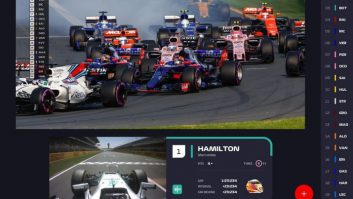I’m not one for sitting on the fence for year-ahead predictions, so here’s mine: I expect 2021 to be fairly similar to 2020 – just bigger, faster and better.
This isn’t actually a cop out. Because purely in terms of innovation, the overall impact of Covid-19 has actually delivered a much-needed dose of innovation to the whole industry.
However awful Covid-19 has been (and it really has), this pandemic has conversely accelerated the digital transformation of our industry exponentially. And although the medicine is bitter, the industry that comes out from this transformation will be a leaner, fitter, more productive and profitable business than the one that went into it.
For as long as the audience had different choices for their entertainment; this industry hasn’t needed to adapt as it was growing and hugely profitable.
But then the internet ‘grew up’, meaning bandwidth became cheap and devices (smartphones, tablets, laptops) became powerful and streaming was possible. It’s hard to remember, but Netflix began its pivot from DVDs by mail to streaming in 2007 – 14 years ago. Today, entertainment has become an internet delivered product.
Frankly for the last 14 years, the industry resisted change, “led” largely by the many senior managers at the top who clung to the old ways of the good old days.
Now, the combination of this period of change plus the pandemic has completely changed the game. We are working in an increasingly digital world where SVoD players, major studios and broadcasters are making time for executives who are leaning towards a digital way of thinking.
Take a look at the man chosen to helm WarnerMedia Jason Kilar, who spent nine years as SVP of Worldwide Application Software at Amazon before founding Hulu. Kilar did not come up via the studio route but is a digital man at heart. And thus it was not surprising when it was WarnerMedia that broke ranks and announced the US release of their 2021 theatrical slate onto streaming at the same time as cinemas.
These sort of appointments, where digital executives are chosen over those hailing from the traditional studio and broadcast mould, are happening time and time again, many times over, at all levels and will continue to do so throughout 2021. This is exactly what needs to happen for our industry to be able to transform itself into a truly digital operation.
It comes as Hollywood and majors studios’ business models continue to spiral. We are now seeing that the old best practises of how to maximise their profit (by windowing strategies) are no longer best any more.
Indeed, in 2021, there will be a real acceptance from audiences that entertainment – as a whole – should be an internet-delivered product. Linear TV ratings and cinema visits will not recover as viewers will continue to expect that content should be delivered to them whenever they want, and wherever they want. Simply put, the balance has shifted from non-digital (theatrical, broadcast, linear) to digital and on demand, and it wont go back. That said, I still expect in a post-Covid world that some of us will go back to watch films in cinemas. They do absolutely provide an experience that is very different from home viewing, but, by then we will have the choice and some will simply choose to watch at home.
It’s safe to say that in the 70-plus years this industry has really been operating, there’s never been such rapid technological development than today. In fact, you could look back and say any previous change was pretty marginal compared to today’s world. But going forward, I do expect that any further shift that comes this year will be fast and possibly brutal, but it might just be what’s needed for this industry to transform itself. In essence, 2021 will be when the old studio and broadcast industry finally dies and is reborn as the entertainment content industry.
In the meantime, I predict we’ll see the continuing struggle of physical TV content markets events and conferences in 2021 – to the point where I don’t think any will be taking place at all; I just can’t see vaccines being rolled out fast enough worldwide or governments opening up their borders for mass international travel anytime soon.
The consequences of this will remain to be seen. But I expect that we’ll see a shift in how new content is marketed and announced worldwide. Will distributors really continue to ‘save up’ their announcements to a date when a virtual event will happen – I don’t think so, they no longer need to.
What will happen is that many studios and distributors’ top staff will have to become more digital savvy in 2021. Undoubtedly, this will increasingly accelerate the usage of digital marketplaces like ours, which are always on and can provide global reach, matching content buyer and content seller frictionlessly, leaving more value in the industry and enabling new value to be found.






